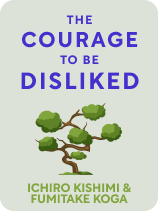

This article is an excerpt from the Shortform book guide to "The Courage to Be Disliked" by Ichiro Kishimi and Fumitake Koga. Shortform has the world's best summaries and analyses of books you should be reading.
Like this article? Sign up for a free trial here .
Do happy people see the world differently than others? Can you choose to be happy or does happiness depend on circumstance?
In their book The Courage to Be Disliked, Kishimi and Koga argue that happiness is a mindset and a choice. They outline the four ways that happy people choose to see the world that sets them apart from unhappy people.
Here’s how to live a fulfilling life by changing your mindset.
1. Happy People Aim to Help Others
If you want to know how to live a fulfilling life, the first step is to help others. Kishimi and Koga argue that instead of seeking approval, happy people make it their ultimate goal to help others. They feel genuine pleasure when they can contribute to the well-being of those around them. In this way, all it takes to be happy is to honestly believe that you’re useful to someone.
It’s important to note that feeling useful—not appreciated—is the key to their happiness: Kishimi and Koga assert that as long as happy people honestly believe that they’re helping others, they feel no emotional attachment to what others think of them. This is the “courage to be disliked” from the book’s title.
Kishimi and Koga argue that it’s inevitable that some people will dislike you. No matter what you do, there will be someone in the world who would rather you do it differently. The only way to attain sustainable happiness is to work up the courage to embrace this fact and free yourself to live what you believe to be a good life, no matter what other people think.
(Shortform note: A helpful way of coping with the fact that some people will inevitably dislike you is to look at rejection as the universe’s way to keep you away from someone who isn’t good for you. After all, the more someone dislikes you, the less likely it is that they have the values and disposition that would make you enjoy spending time with them.)
| Usefulness Is Happiness Many sources back up Kishimi and Koga’s claim that usefulness is the most reliable source of happiness. Some take this argument to the extreme, claiming that usefulness is an even more vital contributor to happiness than basic safety and security. To illustrate: Many people who enlist in the military become energized with a sense of purpose, even in the thick of a dangerous war where they risk injury and death. When these veterans return home, they often become depressed. Even though they’re much safer and more comfortable, they’ve lost the cause that gave their lives meaning and made them feel useful. Kishimi and Koga make the case that you need to decide for yourself what “useful” means. In Man’s Search for Meaning, Victor Frankl places even more importance on this task. He explains that to live a fulfilling life, each individual must discover what purpose they’re living for—and ultimately, what’s worth dying for. Once you determine the most useful thing you could do with your life, doing anything else would make you feel like you’re wasting your brief time on earth. This is why it’s so important to overcome the need for approval and cultivate “the courage to be disliked”—if you fulfill the expectations of others but don’t feel useful, you won’t be happy. |
Helping Others Doesn’t Require Sacrifice
For happy people, helping others isn’t a personal sacrifice—it’s something they do primarily for themselves. The authors admit that this may sound selfish or dishonest, but Kishimi and Koga insist that it’s perfectly fine if your life purpose is to make yourself happy.
Because happy people are fulfilled by doing good for others, they’re able to serve others unconditionally. According to Kishimi and Koga, helping others because it makes you happy is a far more potent motivator than if you were helping others just because it’s the “right thing to do.” Chasing ascetic sacrifice to be a “good person” is nothing more than the need for approval in disguise.
| Rewards Flow to Those Who Serve Unconditionally In The Monk Who Sold His Ferrari, Robin Sharma cites a Chinese proverb about helping others: When you give away a flower, some of its sweet scent sticks to your hand. Here, Sharma’s Buddhism-inspired ideas align with Kishimi and Koga’s Adlerian psychology—by helping others, you’re simultaneously helping yourself. Unlike Kishimi and Koga, Sharma emphasizes that the people you care for will give you some of life’s sweetest gifts in return—for example, he argues that if you show continuous love to good friends, they’ll be there to support you in times of need. Whereas Kishimi and Koga deny the need to receive anything in return from those you serve, Sharma sees relationships as a more traditional give-and-take. However, it’s possible to embrace both perspectives: When you do good without expecting to receive anything in return, every gift is an added bonus on top of the intrinsic fulfillment that Kishimi and Koga promise. |
2. Happy People Believe We All Help Others by Simply Existing
Since all you need to to be happy is to feel like you’re helping others, Kishimi and Koga assert that anyone can be happy by recognizing the fact that their mere existence makes others happy.
Humans care about each other. Other people don’t need to do anything special to improve our lives—their mere presence is gratifying. To illustrate: The day your child is born, they don’t need to do anything impressive to make you happy; they just need to exist.
Using this logic, happy people believe that all humans are valuable, even if they haven’t done anything “good” with their lives. Kishimi and Koga insist that, because they hold this belief, happy people are able to accept themselves unconditionally. Even if they’ve made countless mistakes in the past, or are far less well-adjusted than their peers, happy people realize that their existence is still a gift to others and feel good about themselves despite their flaws.
Kishimi and Koga admit that some people do more good than others. However, whereas unhappy people would see the goodness of others as a threat to their image, happy people celebrate others’ success. Since they believe everyone has the power to make others happy by simply existing, and therefore everyone has value, happy people have no need to see life as a competition. The success of others can never take away any of your innate human value.
| How to Accept Yourself It’s easy to rationally understand that we all have value, but it’s more difficult to genuinely feel this way about yourself. In Radical Acceptance, Tara Brach describes a meditative practice designed to help you embrace your inherent value and alleviate your internal suffering. This practice, “radical acceptance,” is a two-part process—first, you recognize the emotions and sensations you’re feeling, and second, you offer yourself compassion, wishing yourself well instead of resenting yourself for not being good enough. Brach implies that you should practice doing this as much as possible. For example, imagine you see a sweater you can’t afford and feel the impulse to shoplift it, immediately feeling guilty for considering theft. To practice radical acceptance, you would first notice that you feel guilty, then ask yourself gentle questions until you realize why. Then, you’d offer compassion, reassuring yourself that selfish desires don’t make you a bad person. Instead of judging people based on their inherent baseline value to others, as Kishimi and Koga do, Brach argues that we all have value due to a shared nature of goodness. Drawing from Buddhism, Brach states that each of us, at our core, is a being of pure awareness and love. We can feel worthy because we are a part of a universal force of good, not merely because we exist. However, like Kishimi and Koga, Brach acknowledges that accepting yourself as worthy and valuable makes it easier for you to genuinely want the best for others and celebrate their successes. Buddhists label this supportive type of love “metta,” or “lovingkindness.” Brach insists that if you force yourself to show others the same radical acceptance you show yourself, over time, you’ll feel genuine concern for their wellbeing, even if those feelings weren’t there to begin with. |
3. Happy People Set Boundaries in Their Relationships
Kishimi and Koga argue that the foundation of all healthy, fulfilling relationships is strict boundaries separating your life from the lives of those around you. To this end, the authors offer a simple rule that dictates ideal personal boundaries: No one should take responsibility for a decision that doesn’t directly impact their own life. For example, if a student’s best friend goes out and parties all night instead of writing an important term paper, it would be ultimately damaging to the relationship for that student to write their friend’s paper for them.
Additionally, Kishimi and Koga argue that you shouldn’t let other people hold you responsible for their tasks. Don’t feel obligated to do anything for anyone—as we’ve established, relationships built on conditions and restrictions are unfulfilling for both parties. All your acts of service should be given unconditionally because you’re happy to give them.
For example, it would be wrong for your brother to guilt you into babysitting his kids. Ideally, it would make you happy to help him out in this way, and you would gladly volunteer. However, if the experience is deeply unpleasant for you, you shouldn’t feel obligated to do it. Moral impositions like this would eventually cause you to resent him, ruining the relationship.
Setting boundaries like this can be difficult, especially with family members and close friends, but Kishimi and Koga insist that this is a prerequisite for any healthy relationship.
| The Origins of Codependency In Codependent No More, Melody Beattie explains that failure to set proper boundaries is a central symptom of codependency—a relationship dynamic characterized by self-neglect and overinvestment in another person. Beattie’s advice on avoiding codependency closely overlaps with Kishimi and Koga’s—she defines self-care as the process of taking responsibility for your own life and emphasizes how important it is to avoid fixing other people’s problems. However, she dives more deeply into the topic, explaining why it is that codependents behave the way they do. Beattie argues that codependency is a set of habitual coping mechanisms developed as a reaction to prolonged stress. The source of the prolonged stress that causes codependency may be obvious—for example, a substance abuse problem—or it could be subtle: For example, Kishimi and Koga would argue that the persistent failure to earn a loved one’s approval would cause enough stress to foster codependency. Desperate to alleviate this stress, codependents believe they need to control their loved ones to make themselves happy, often resorting to emotional manipulation to do so. |
4. Happy People Live in the Present
Finally, happy people ignore the past and future and live fully for the joy of the present. Kishimi and Koga assert that we all have the power to choose to be happy at any given moment.
As we discussed earlier, happy people understand that past traumas have no power to prevent them from being happy, here and now. The flip side of this idea is that likewise, the future should have no bearing on your current happiness. Kishimi and Koga assert that many people think they need to accomplish something great to be happy, but this is a lie. As we’ve established, anyone can be happy by simply recognizing the value they contribute to those around them.
Kishimi and Koga clarify that this doesn’t mean you should avoid working toward any future goals. Rather, you should find meaning and joy in every step of the path toward that goal. This way, if you were to die at any moment, your life wouldn’t feel like a waste.
In short, Kishimi and Koga emphasize that you have the power to find satisfaction and meaning in every individual moment of your life.
| We’re Wired to Live for the Future Earlier, we discussed how we’re biologically predisposed to seek approval. Likewise, another reason our biology stands in the way of our happiness is the fact that we’re biologically predisposed to obsess over the future. The same “default network” in the brain that monitors our social standing is also constantly reconstructing our past and imagining our future. By default, we don’t live in the present. What, then, can we do to find satisfaction and ground ourselves in the moment? Aside from finding fulfillment in every good deed we do for others, as Kishimi and Koga suggest, experts offer these tips: –Investigate your sensory experience. By paying attention to the sights, sounds, smells, tastes, and feelings that are constantly around you, you can override whatever concerns about the future are on your mind and ground yourself in the present. –Practice gratitude. Constantly focusing on the future can be discouraging, as you’re always thinking about things you want but don’t have. Writing out lists of things you’re thankful to have in your life will reorient your attention toward all the parts of your present life that spark joy. –Take a break from technology. While social media and other inventions make us feel connected to a world far bigger than the one around us, they’re a poor substitute for the real thing. Giving your brain some time away from screens will help you appreciate concrete pleasures instead of their digital representations. |

———End of Preview———
Like what you just read? Read the rest of the world's best book summary and analysis of Ichiro Kishimi and Fumitake Koga's "The Courage to Be Disliked" at Shortform .
Here's what you'll find in our full The Courage to Be Disliked summary :
- Why you care too much about what other people think of you
- How to tap into the freedom and joy inherent in human existence
- How to overcome trauma from your past






